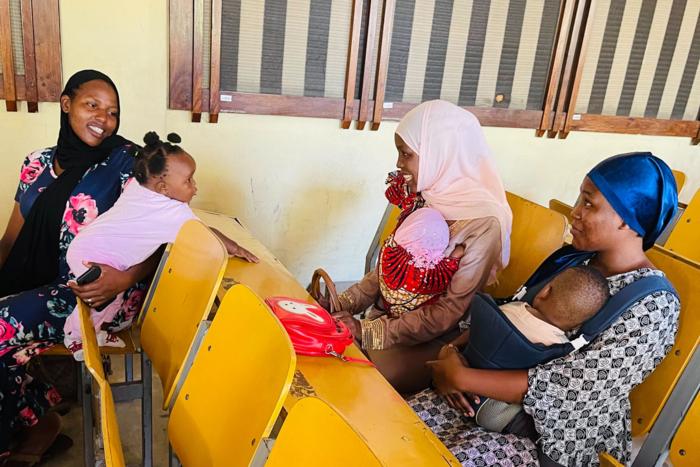An international research team from Tanzania and Japan created a smartphone app and conducted a pilot study of how the app might be used to improve midwives’ knowledge and skills in Tanzania. Their study focused on the app’s potential effects on the learning outcomes of midwives and birth preparedness of pregnant women in Tanzania.

Credit: Dorkasi Mwakawanga, Muhimbili University of Health and Allied Sciences
An international research team from Tanzania and Japan created a smartphone app and conducted a pilot study of how the app might be used to improve midwives’ knowledge and skills in Tanzania. Their study focused on the app’s potential effects on the learning outcomes of midwives and birth preparedness of pregnant women in Tanzania.
The team’s work is published in the journal PLOS ONE on March 31, 2023.
“The smartphone app for midwives showed significant improvements in their learning outcomes, leading to better birth preparations for pregnant women in Tanzania. This study highlights the potential of leveraging technology to enhance midwife education, ultimately contributing to maternal health and addressing high maternal and child mortality rates,” said Yoko Shimpuku, a professor in the Graduate School of Biomedical and Health Sciences, Hiroshima University.
Pregnant women in sub-Saharan Africa have low access to healthcare. In Tanzania, only 51% of pregnant women have four or more antenatal care visits, while the World Health Organization recommends at least eight visits during pregnancy. Because of Tanzania’s high maternal mortality ratio, it is crucial to increase women’s access to healthcare. To improve women’s access, the quality of antenatal care needs to be improved.
The team used a mixed-methods study to provide an educational app for midwives in the intervention group. They obtained data about the continuous use of the app and measured midwives’ learning outcomes. Their next step was to conduct focus group discussions on the usability of the app and surveys among pregnant women about birth preparedness in the intervention and control groups to evaluate if the midwives had provided them with proper information. The control group of pregnant women received regular antenatal care and answered the same survey.
The study included 23 midwives who took part in the testing and provided learning outcome data. Their results showed that 87.5% of the midwives continued to study with the app two months post-intervention. There were 207 pregnant women included in the study. The intervention group of pregnant women had significantly higher knowledge scores and home-based value scores than did the women in the control group, where the app was not used. This home-based value score indicates that the higher the score, the more women tended to prefer giving birth at a health facility instead of at home.
From conducting earlier studies, the research team knew that there is extensive smartphone use in Tanzania, especially among the population of younger people. The app the team developed provided updated information on World Health Organization guidelines and practical suggestions for midwives to use for health education at antenatal care visits. They conducted the study in two health facilities in Dar es Salaam, the largest city in Tanzania, between October 2019 and March 2021.
The midwives using the app received training on how to use it. They were also reimbursed for the cost of the mobile data they used with the app, so that the cost would not hinder them from using the app. The app used an online education platform called Goocus. The information on the app included World Health Organization recommendations on antenatal and intrapartum care for pregnant women. The team also created content with locally adapted illustrations explaining why preventative behaviors or early treatment were important and showing midwives how to demonstrate these concepts in their antenatal care. The videos on the app were narrated in Kiswahili, a language most local women understood better than English.
Looking ahead, the team’s next step is to refine and expand the app for larger-scale implementation, focused on reducing maternal and child mortality rates in developing countries, starting with Tanzania. “The ultimate goal is to develop additional apps targeting pregnant women and their families, while accumulating robust evidence on the app’s long-term effects and effectiveness through further research. This aims to enhance overall understanding and awareness of care from pregnancy to postpartum, ultimately improving maternal health,” said Shimpuku.
##
The research team includes Yoko Shimpuku and Naoki Hirose from Hiroshima University, Japan; Beatrice Mwilike and Dorkasi Mwakawanga from Muhimbili University of Health and Allied Sciences, Tanzania; Keiko Ito from Kyoto University Hospital, Japan; and Kazumi Kubota from The University of Tokyo Hospital, Japan.
The research is funded by Japan Society for the Promotion of Science, Kyoto University, and Japan Agency for Medical Research and Development.
About Hiroshima University
Since its foundation in 1949, Hiroshima University has striven to become one of the most prominent and comprehensive universities in Japan for the promotion and development of scholarship and education. Consisting of 12 schools for undergraduate level and 5 graduate schools, ranging from natural sciences to humanities and social sciences, the university has grown into one of the most distinguished comprehensive research universities in Japan. English website: https://www.hiroshima-u.ac.jp/en
Journal
PLoS ONE
DOI
10.1371/journal.pone.0283808
Article Title
Development and pilot test of a smartphone app for midwifery care in Tanzania: A comparative cross-sectional study
Article Publication Date
31-Mar-2023




